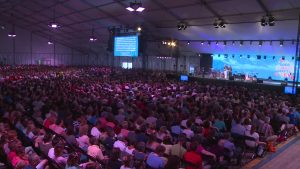Paul's callDo not unequally yoke with unbelievers (...)" (2 Corinthians 6:14) is much applied to marriage. A warning not to marry an unbeliever. Now that is okay as far as I am concerned, but if you read further in this section it is apparent that Paul is talking about the Christian church. In verse 16 the people of God are called "(...) the temple of the living God"and in this it is not intended that believers should associate with unbelievers.
Faithful and incredulous
In modern parlance, a person is soon called 'believer'. In practice, it often comes down to the fact that when someone calls themselves a Christian and is ecclesiastical, we also label them as 'believers'. In this way, everyone who belongs to a Christian community is called a believer, especially if they do some kind of service there.
This really dawned on me when I was watching a meeting at Opwekking 2017 via livestream[1]. A large crowd of perhaps a few thousand people who sat and listened to a sermon on the Holy Spirit.

Those present were addressed as 'the church' and as 'we'; as a homogeneous group of believers. 'The Spirit is in us and with us' was said several times. But what came to my mind was: “These people may all believe something, but would they also be born again?”.
An impossible question
Many Christians are religious, but whether they are also born again is another question. I suspect that there are hardly any communities left where that question is asked. Imagine if you doubted that, wouldn't you pull the bottom out of the community? You could say it's not 'religiously correct' ('relicor’) is to ask this question. Admittedly, it is also difficult. But the fact that we don't is perhaps one of the great dramas in Christendom. It leads to the communities being made up of believers and unbelievers. They are all Christians, all believers, but not all born again.
The people of God in the land
God led His people Israel out of Egypt through the wilderness into the Promised Land. In the country they mainly faced two kinds of adversaries.
- The Philistines (see for example here) who, like the people of Israel, have come to live in the land of Canaan from elsewhere[2]. So they lived in the land and wanted to dominate Israel continuously (eg Judges 13:1 and 14:4). The Lord used the Philistines as a means of discipline to bring His people back from their idolatry (eg Judges 10:6-7). Characteristic of the Philistines are the destructive plundering they carried out (Ezekiel 25:15). Between Israel and the Philistines there was aan eternal enmity' (Ezekiel 25:15).
The Philistines were the adversaries who fought God's people and robbed them of God's blessings. - The Canaanite nations who lived there when Israel settled in the land. God ordered His people to exterminate and drive them out, otherwise they would serve the gods of these nations (see, for example, Deuteronomy 20:16-18). But there are Canaanites left in the land, and these have become a snare to Israel, exactly what Joshua warned the people about (see eg Joshua 23). Characteristic here is the danger of marriage ties (Joshua 23:12), that is, close and intimate relationships, through which they would forsake the Lord their God and start worshiping idols.
So the Canaanites were adversaries who tried to tempt them into idol worship through close relationships with God's people.
Corinth in 2017
Also all these histories of Israel are described “(...) for a warning to us, upon whom the end of the ages has come” (1 Corinthians 10:11). In Corinth all kinds of denominations had already arisen and practices and teachings that were not good, about which Paul writes extensively (see also the summary of 1 Corinthians). It probably didn't help much, because in his second letter he exhorts the believers to leave the communities where believers and unbelievers go hand in hand and where Christians worship idols.
“Be not unequally yoked with unbelievers, . . . Or what does a believer share with an unbeliever? Or what connection is there between the temple of God and the idols? For thou art the temple of the living God... Therefore go out from among them, and separate yourselves, saith the Lord, and touch not the unclean thing, and I will receive you...” (2 Corinthians 6:14-18)
The believers in Corinth were mixed with unbelievers and with Christians who worshiped idols. In that respect you could say that in Corinth there were many 'Philistines and Canaanites'. People who were not really born again, but were only outwardly professing Christians. They lead others in letting go of the Lord God and His Word and tempting them into idolatry. In practice, both aspects – disbelief and idolatry – often go hand in hand.
It is sad to see that things had gone downhill so quickly in Corinth. The Christian community was divided into denominations and unbelief and idolatry were rampant. And all that in less than forty years after God's Spirit was poured out on the day of Pentecost.
How recognizable is this image even today. Communities that get off to a good start can be seen falling into spiritual ruins within a few decades, in which unbelief and idolatry have become commonplace.
The visible and invisible church
In the past there have been all kinds of speculations about 'the visible and the invisible church', but in recent years you don't really hear those expressions anymore. It's completely gone off the radar and the prevailing sentiment is, 'We're all Christians, so we're the Church together'. Until a year or so ago you heard the expression 'a born again christian' (a born-again Christian), but today I don't hear it anymore. The question of whether someone who calls himself a Christian is actually born again is apparently no longer relevant to the masses.
Yet it is the most important question there is and we must realize that what manifests in the world as 'the Church' is not 'the Church of God'[3] is.
The real Church, the 'Church of the Living God' (1 Timothy 3:15) exists exclusively from those who have turned to God and have been born again.
It is as the Lord Jesus Himself has said in what other words:Unless one is born again, he cannot see the kingdom of God.” (John 3:3). "To be born again" here also means "to be born from above" and it denotes receiving the Holy Spirit at conversion. Then everything changes! Elsewhere we have already seen what it means to be born again. Such a person received the Holy Spirit upon conversion, and he poured out the love of God in his heart (Romans 5:5). That incomprehensible miracle results in the believer
- God the Father and the Lord Jesus loves
- God's Word loves and
- loves all who are born of God.
But if this is no longer seen in a Christian community, you get a mixture of believers and unbelievers. And that's the worst thing there is:
- for the person himself. You can be a Christian, participate in the Christian community, but not be born again. Then you're still lost in the end. You think you are there, but your destination will not be heaven. That is terrible!
- for the community. For it means that it will eventually fall into spiritual decline.
Ephesus – leaving the first love
The latter is illustrated by the brief description given in Revelation 2 (verses 1-7) of the church in Ephesus. It is a church that receives all praise from the Lord. As a believer you would really feel at home there. Carnal Christians could not bear them and they exposed false apostles. And yet the Lord says
“But I have against you that you have left your first love. Then remember from what height you have fallen, and repent and do the first works. But if not, I will soon come to you and remove your candlestick from its place, if you do not repent.” (Revelation 2:4,5)
They did the right things, but not from the love they had in the beginning. The love for the Lord Jesus was no longer the driving force. That love had become less and less and that would also have consequences for their love for the Word of God and brotherly love.

They had to repent of this, and if they didn't, the Lord Himself would take the candlestick from them. In other words, they would then no longer receive light from God's Word and end up in spiritual darkness. Surely they would then lose their discernment and no longer see who did not really belong to the Church. We see from this how'leaving the first love' eventually leads to spiritual darkness. These are serious warnings, also for us in 2017!
Keep yourself in the love of God!
Judas, the brother of the Lord Jesus, writes a short but firm letter to the believers, which he sends three times "loved ones' mentions (verses 3, 17, 20). He writes about and warns against the people who have entered the church, but are not really born again. They are described in vehement words, and judgment is given to them as well. Being 'unbelievers' (see verse 5), 'natural people who do not have the Spirit' (verse 19).
One of the things the believers had to do is 'keep oneself in the love of God' (verse 21). That's special, because it means
. . . that the love of God, which had been poured out into their hearts by the Holy Spirit, must be kept alive. Very concretely: continue to love the Lord Jesus, your Saviour, love the Word of God and love your brothers and sisters in the Lord! Fill your heart with the Lord Jesus Christ!
According to Judas, that is the only way to 'in this last time' (Jude :18) to stand.
Leaving the first love and failing to keep ourselves in the love of God ultimately leads to spiritual darkness in our personal and community life.
Finally
In fact it is remarkable that you start to think about the mixing of believers and unbelievers in the Christian community and its consequences and that you come to yourself as the cause. That we who belong to the Lord Jesus often faint in our love for Him!
“The Word of God is living and powerful and sharper than any two-edged sword” (Hebrews 4:12)
[1] I'm not talking about the "quality" of the speech here; a high emotional level coupled with unbiblical content.
[2] They lived in the area that is today the Gaza Strip and which is now Palestinian territory. Could the similarities be coincidental?
[3] For example, Acts 20:28 and many other places.



